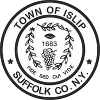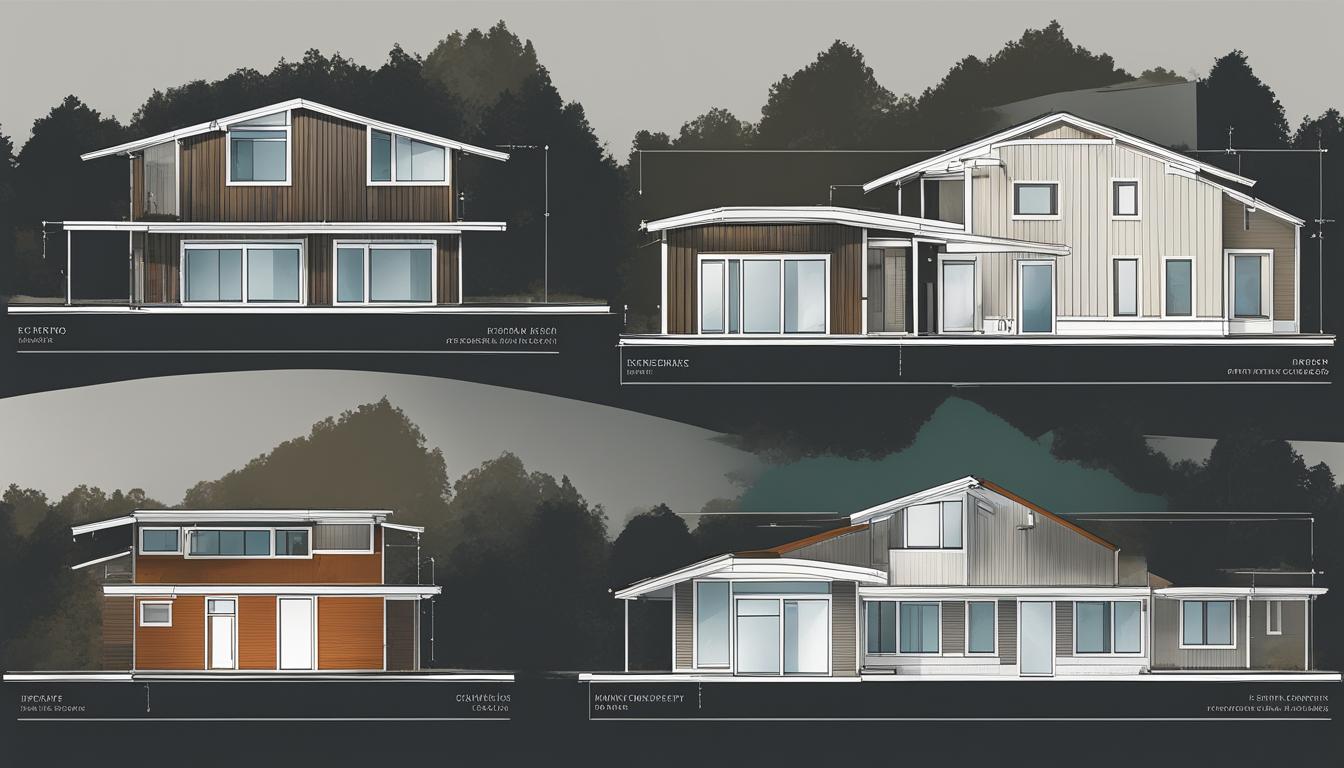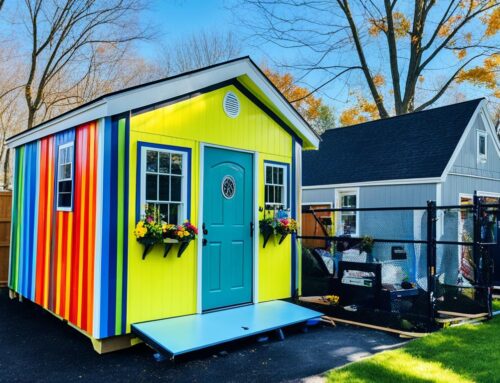Obtaining a building permit can be a time-consuming and complex process. However, understanding the steps involved can help you navigate it more efficiently. A building permit is an authorization granted by a local building department that allows you to perform specific construction work. The permitting process typically begins at the building department, where you’ll need to submit a complete application and supporting documents. These documents may include site plans, structural drawings, architectural floor plans, mechanical drawings, and more. It’s important to ensure that your plans and specifications comply with local building codes. The plan check process involves a review of your drawings and calculations by building officials. Revisions may be required before permits are issued. Some projects may qualify for online or over-the-counter permits, which can expedite the process. In addition to building permits, you may also need approvals from various local, state, and federal agencies, depending on the nature of your project. Hiring an expert design team can help streamline the permitting process and ensure compliance with all necessary regulations.
Key Takeaways:
- Understanding the building permit application process can help expedite approvals.
- Submit a complete application with the required supporting documents.
- Ensure your plans and specifications comply with local building codes.
- Be prepared for the plan check process and potential revisions.
- Consider hiring an expert design team to streamline the permitting process.
Types of Building Permits You May Need
When it comes to building permits, there are various types you may need, depending on the scope and nature of your construction project. Understanding these permits and their specific requirements is crucial for a smooth application process and ensuring compliance with building codes and regulations.
Residential Permits
If you’re planning to construct or renovate a home, you’ll need residential permits. These permits cover a wide range of projects, including single-family homes, duplexes, townhouses, and accessory structures such as garages or sheds. The specific documentation and guidelines for residential permits may vary depending on your location, so it’s essential to consult with your local building authority.
Commercial Permits
For projects involving commercial buildings, such as office spaces, retail stores, or industrial facilities, you’ll need commercial permits. Commercial permits have unique requirements, as these structures often have different safety regulations and occupancy standards compared to residential buildings. It’s important to work closely with your design team and local building authority to ensure that your plans meet all the necessary guidelines.
Agricultural Permits
If you’re engaging in agricultural activities or constructing agricultural buildings, such as barns, greenhouses, or silos, you’ll need agricultural permits. These permits are specific to the agricultural industry and may have different guidelines and regulations compared to residential or commercial projects. Consulting with experts in agricultural building permits can help streamline the process and ensure compliance with all necessary requirements.
Additional Permits
Aside from building permits, there are additional permits you may need depending on the nature of your project. Some examples include permits for dirt work and land clearing, utility installations, septic systems, and critical areas such as wetlands. It’s important to conduct thorough research and understand the specific permits required for your project before starting the application process. Failure to obtain all the necessary permits can result in project delays and potential legal issues.
To ensure a smooth permit application process, it’s recommended to work with professionals who have expertise in navigating the permit requirements and guidelines. Traci’s Permits is a trusted and experienced provider that offers unmatched expertise in the Long Island permit process, specializing in Suffolk County and Nassau County. To ensure timely approvals and code compliance, contact Traci’s Permits at 631-492-0927.
| Permit Type | Scope | Requirements |
|---|---|---|
| Residential | Single-family homes, duplexes, townhouses, accessory structures | Compliance with residential building codes, site plans, architectural floor plans |
| Commercial | Office spaces, retail stores, industrial facilities | Meeting commercial building standards, fire safety regulations, occupancy permits |
| Agricultural | Barns, greenhouses, silos | Agricultural industry regulations, compliance with agricultural zoning |
| Additional Permits | Dirt work and land clearing, utility installations, septic systems, wetlands | Specific permits for each activity and compliance with relevant regulations |
Where to Obtain Building Permits
Building permits are obtained from the local building authority, which could be the city or county depending on your location. To determine the correct authority, you can start by contacting the entity to which you pay your property taxes. Most building authorities have information available on their websites, including the necessary application forms and instructions. If you’re still in the process of securing property, it’s essential to research the building regulations and permit requirements for each potential plot. The building authority will be able to provide you with the specific documents and approvals needed for your building plan.
To make the process smooth and hassle-free, Traci’s Permits is here to assist you. With our unmatched expertise in the Long Island permit process, we ensure timely approvals and code compliance for Suffolk County and Nassau County. For expert permit assistance, call us at 631-492-0927.
Building Authority Contacts
| Location | Building Authority | Contact Information |
|---|---|---|
| Long Island | Suffolk County | Phone: 631-853-4600 Email: info@suffolkcountyny.gov Website: www.suffolkcountyny.gov |
| Nassau County | Phone: 516-572-0356 Email: tof@Nassaucountyny.gov Website: www.nassaucountyny.gov |
Costs of Obtaining Building Permits
When embarking on a construction project, it’s essential to consider the costs associated with obtaining building permits. The expenses can vary depending on your location and the type of structure you’re building. Generally, the permitting process can range anywhere from $5,000 to $15,000 or more, but these figures may significantly fluctuate.
To get an accurate cost estimate for your specific project, it’s crucial to contact your local building authority. They will provide you with the necessary information and guide you through the cost calculation process. Several factors can impact the overall cost, including:
- The complexity of your project: more complex projects usually require a more detailed review, which can lead to higher costs.
- Commercial or residential use: building permits for commercial projects may have additional requirements and inspections, resulting in increased costs.
- Involvement of critical areas near water sources: if your project is near water sources or designated critical areas, additional reviews or permits may be necessary, contributing to higher costs.
Furthermore, including utilities like sewer or septic systems in your structure can also increase permitting costs. It’s crucial to carefully evaluate your project’s requirements and consult with the local building authority to ensure compliance with regulations while managing costs effectively.
Traci’s Permits offers unmatched expertise in navigating the building permit application process for Suffolk County and Nassau County on Long Island. Our team ensures timely approvals and code compliance, making the process efficient and hassle-free. For expert permit assistance, contact us today at 631-492-0927.
Key Factors Impacting Permit Costs
| Factor | Description |
|---|---|
| Project Complexity | The level of project complexity influences the required review time and potential revisions, affecting overall costs. |
| Use Type | Building permits for commercial projects often have stricter guidelines and inspections, leading to higher costs compared to residential projects. |
| Critical Areas | Projects near water sources or designated critical areas may require additional permits or reviews, resulting in increased costs. |
| Utilities | Including sewer or septic systems in your project may require additional permits, contributing to the overall permitting costs. |
Timeline for Obtaining Building Permits
The timeline for obtaining building permits can vary depending on the complexity of your project and its location. On average, it takes 6-12 months to gather all the necessary information, submit documentation, and obtain the permits.
However, it’s important to note that timelines can be shorter or longer based on your specific circumstances. It’s recommended to contact your local building authority to get a more accurate timeline for your project.
During the permitting process, you’ll need to submit all the required documentation and plans for review. The building authority will assess the compliance of your building plans with safety standards and other regulations before issuing the permits.
Steps to Obtain a Building Permit
- Gather all required documentation and plans for your construction project.
- Submit the documentation and plans to the local building authority.
- Wait for the building authority to review your submission and assess compliance with safety standards and regulations.
- If revisions or additional information are requested, make the necessary adjustments and resubmit.
- Upon approval, receive the building permits necessary to begin your construction project.
Building Permit Documentation
When submitting documentation for a building permit, it’s important to include:
- Complete architectural floor plans
- Structural drawings
- Site plans
- Mechanical drawings
- Other relevant documentation specific to your project
Traci’s Permits offers unmatched expertise with Long Island’s permit process. We ensure timely approvals and code compliance for Suffolk County and Nassau County. For expert permit assistance, Call: 631-492-0927.
| Step | Description |
|---|---|
| 1 | Gather all required documentation and plans for your construction project |
| 2 | Submit the documentation and plans to the local building authority |
| 3 | Wait for the building authority to review your submission and assess compliance |
| 4 | Make any necessary revisions or provide additional information upon request |
| 5 | Receive the building permits upon approval |
Creating and Submitting Your Building Plan
Your building plan is a crucial component of the permitting process. It consists of all the necessary documentation, reports, and blueprints that support your construction project. The building plan is submitted to the local building authority for review and approval. It’s essential to ensure that your plan includes all the required permits and approvals specific to your project, such as land clearing permits, utility permits, geological technician reports, and wetland or critical area reports.
The building authority will review your plan and may request revisions or additional information before issuing the permits. To minimize the risk of rejection, it’s recommended to verify all the necessary documents and reports with the building authority prior to submission.
Key Things to Include in Your Building Plan:
- Complete set of architectural and structural drawings
- Site plans showing property boundaries and structures
- Detailed floor plans
- Mechanical, electrical, and plumbing drawings
- Fire safety plans
- Energy efficiency calculations
- Land clearing and utility permits
- Geological technician reports
- Wetland or critical area reports
It’s crucial to ensure that your building plan complies with the building permit rules and regulations set by your local building authority. By including all the necessary information and obtaining the required approvals, you increase the chances of a smooth and efficient permitting process.
Considerations for a Smooth Permitting Process
To expedite the permitting process in Long Island, Nassau County, and Suffolk County, there are a few considerations to keep in mind. One option is to work with a permit expediter who can guide you through the submission process and ensure all necessary information is included. Traci’s Permits is a trusted expert in navigating the Long Island permit process, offering unmatched expertise and ensuring timely approvals and code compliance.
Pre-application meetings with the building authority can also help clarify requirements and gather all the relevant information for your building plan. By discussing your project with the authorities beforehand, you can address potential issues and ensure you have all the necessary documentation ready.
It’s important to review zoning and use tables to determine if your land can support the intended use of your structure. These tables provide valuable information on the specific regulations and restrictions that apply to your property. They can usually be found on the building authority’s website under the zoning or land use sections.
Expert Tip:
“Traci’s Permits offers unmatched expertise with Long Island permit process. We ensure timely approvals and code compliance for Suffolk County and Nassau County. For expert permit assistance, Call: 631-492-0927.
Proactively addressing potential issues and ensuring compliance with regulations can significantly increase the efficiency of the permitting process. By working with an experienced permit expediter and staying informed about local zoning and land use regulations, you can expedite the approval process and move forward with your construction project.
Good Practices for Building Permit Processes
Obtaining a building permit can often be a complex and time-consuming process. However, implementing good practices can help streamline the permitting process and ensure compliance with building permit rules and regulations.
Here are some key guidelines to follow:
- Establish Clear and Coherent Rules: Providing clarity for builders by establishing clear and coherent building permit guidelines can minimize confusion and promote compliance with regulations.
- Transparency and Accessibility: Making building permit rules and regulations easily accessible through online platforms and publications can enhance understanding and facilitate compliance.
- Building Quality Control and Safety Mechanisms: Implementing quality control measures and safety mechanisms is crucial for protecting public safety and ensuring that all construction projects meet the required standards.
- Evaluating Projects Based on Risk Categories: Differentiated permitting processes based on risk categories can help expedite the approval of lower-risk projects, while ensuring that higher-risk projects undergo a more thorough review.
- Implementing One-Stop Shops: One-stop shops, which consolidate various permitting processes into a single point of contact, can streamline coordination and increase overall efficiency in obtaining building permits.
By adhering to these building permit guidelines and following good practices, you can contribute to a more efficient and transparent building permit process, saving time and resources for all parties involved.
Traci’s Permits offers unmatched expertise with the Long Island permit process. We ensure timely approvals and code compliance for Suffolk County and Nassau County. For expert permit assistance, Call: 631-492-0927.
Conclusion
The process of obtaining a building permit may seem overwhelming, but with proper knowledge and preparation, it can be navigated efficiently. By understanding the steps involved and researching specific requirements, you can improve your chances of acquiring a building permit quickly and smoothly. Working with experts, such as Traci’s Permits, who specialize in the Long Island permit process, can ensure timely approvals and code compliance for Suffolk County and Nassau County.
To expedite the permit acquisition process, it’s crucial to gather all the necessary documentation, including a complete building plan, and address any revisions or additional requirements from the building authority. Following guidelines and best practices such as pre-application meetings and working with a permit expediter can also help streamline the process. Remember to consult with your local building authority for specific requirements and timelines related to your project.
If you’re in need of expert permit assistance in Long Island, including Nassau County and Suffolk County, contact Traci’s Permits at 631-492-0927. Our team has unmatched expertise in the permitting process and can guide you through the steps needed to obtain your building permit efficiently and in compliance with local codes and regulations.
FAQ
How can I navigate the building permit process to get approval fast?
Understanding the steps involved and working with experts can help expedite the process. Submitting a complete application with all necessary documents and addressing any revisions or additional requirements from the building authority can also increase efficiency.
What types of building permits may I need?
The types of building permits you need depend on the scope and nature of your construction project. Common types include residential permits, commercial permits, and agricultural permits. Additional permits may be required for land clearing, utility installations, septic systems, and critical areas such as wetlands.
Where can I obtain building permits in Long Island, Nassau County, or Suffolk County?
Building permits are obtained from the local building authority, which could be the city or county depending on your location. Contact the entity to which you pay property taxes to determine the correct authority. Most building authorities have websites with application forms and instructions.
How much do building permits cost?
The cost of building permits can vary greatly depending on your location and the type of structure you’re building. Generally, the process can cost anywhere from $5,000 to $15,000. Factors that impact the cost include the complexity of the project, whether it’s commercial or residential, and if it involves critical areas near water sources or utilities.
How long does it take to obtain building permits?
The timeline to obtain building permits can vary depending on the complexity of your project and location. On average, it can take 6-12 months to gather all necessary information, submit documentation, and obtain the permits. However, timelines can vary, so it’s best to contact your local building authority for a more accurate estimate.
What is involved in creating and submitting a building plan?
Your building plan is a crucial component of the permitting process. It includes all necessary documentation, reports, and blueprints that support your construction project. The plan is submitted to the local building authority for review and approval. Ensure your plan includes all required permits and approvals specific to your project.
Are there any considerations for a smooth permitting process?
Working with a permit expediter, having pre-application meetings with the building authority, reviewing zoning and use tables, and proactively addressing potential issues can all contribute to a smoother permitting process. Ensuring compliance with regulations is key.
What are some good practices for building permit processes?
Good practices for building permit processes include establishing clear and coherent rules, providing transparent and accessible regulations via online platforms, implementing building quality control and safety mechanisms, evaluating projects based on risk categories, and implementing one-stop shops for coordination and efficiency.
How can I expedite the acquisition of a building permit?
To expedite the process, consider working with a permit expediter, having pre-application meetings with the building authority, reviewing zoning and use tables, and ensuring compliance with regulations. Hiring an expert design team can also streamline the permitting process.












